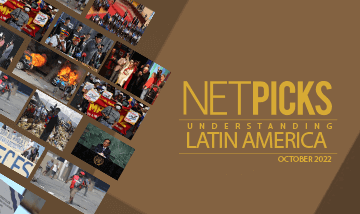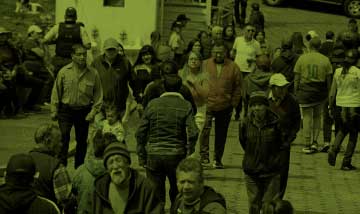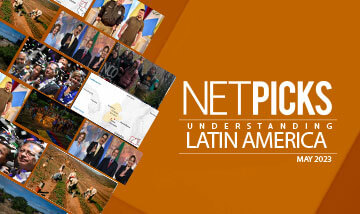Índice
- MIXED SIGNALS FROM BRAZIL
- BUKELE’S RE-ELECTION BID FUELS NEW CONCERN IN EL SALVADOR
- ‘THEY HAVE NO FEAR AND NO MERCY’: GANG RULE ENGULFS HAITIAN CAPITAL
- MEXICO DEEPENS MILITARIZATION. BUT FACTS SHOW IT IS A FAILED STRATEGY
- COLOMBIA PRESIDENT GUSTAVO PETRO: END THE WAR ON DRUGS
- INDIGENOUS LEADERS SEEK GLOBAL PACT TO PRESERVE 80% OF AMAZON FOREST
Understanding Latin America
Dear readers and colleagues, this month we bring you six articles that reflect the reality of Latin America: one each from Brazil, El Salvador, Haiti, Mexico, Colombia and one the Amazon Forest.
- Mixed signals from Brazil
- Bukele’s re-election bid fuels new concern in El Salvador
- ‘They have no fear and no mercy’: gang rule engulfs Haitian capital
- Mexico deepens militarization. But facts show it is a failed strategy
- Colombia president Gustavo Petro: end the war on drugs
- Indigenous leaders seek global pact to preserve 80% of Amazon Forest
.
MIXED SIGNALS FROM BRAZIL
Brazil’s first round of elections took place last weekend, and the results came as a surprise to many. Brazil’s former president Luiz Inácio “Lula” da Silva won with 48.5 percent of the vote. However since it wasn’t an outright majority, both Lula and the second place winner, current president Jair Bolsonaro, will head off in a second round of elections on October 30. The results came as a surprise to many, as Bolsonaro – largely known for creating policies that propelled the destruction of the Amazon rainforest and denying the existence of the coronavirus that may have costs thousands of lives – received 43.2 percent of the vote. This is much higher than what earlier polling had predicted, at 36 percent, causing Bolsonaro supporters and the parties backing his government to claim the election was a success, writes the director of the Rosa-Luxemburg Foundation’s Sao Paulo office in his first analysis. Lula remained optimistic however, and also claimed the elections a success, even though many of his supporters were clearly demoralized for not winning outright in the first round, which many had predicted. According to the author, Lula da Silva’s victory in the first round of voting is undoubtedly a success — both for the Left and for democratic Brazil — and a good starting point for the second round on 30 October. However, if Lula does win in the second round, governing will be a challenge in the face of a new right-wing majority in both the Senate and Parliament and radical Bolsonaro supporters on the streets. Read more here to understand Brazil’s complicated political dynamics moving forward.
Andreas Behn, October 3, 2022
https://www.rosalux.de/en/news/id/47124
.
BUKELE’S RE-ELECTION BID FUELS NEW CONCERN IN EL SALVADOR
El Savador President, Nayib Bukele, made the controversial announced this month that he will run for re-election in 2024. The announcement has been met with both praise by those who say his policies have improved the country and condemnation by those who say this is part of the country’s deeper descent into authoritarianism. El Salvador’s constitution bans consecutive re-elections, however last year the Constitutional Court – largely run by Bukele loyalists – changed this, and ruled that he could run again. Human rights advocates say this is just the latest example of Bukele’s government eroding democratic norms that were established by the 1992 peace accords, which put an end to the 12-year civil war that killed 75,000 people. The accords included limiting military participation in politics, and judicial reforms aimed at augmenting the independence of the judiciary from political party control. Breaking these norms could unleash a new wave of violence that takes the country back to scenarios experienced during the civil war, warns local human rights activist Celia Medrano. However, many people in the country are content to let Bukele bend the rules. The young president has an 87 percent approval rating, mainly by those who say his state of emergency have helped improve security in the country. Human rights groups have also criticized these extreme measures.
Anna-Cat Brigada, September 20, 2022
https://www.aljazeera.com/news/2022/9/20/bukeles-re-election-bid-fuels-fresh-concern-in-el-salvador
.
‘THEY HAVE NO FEAR AND NO MERCY’: GANG RULE ENGULFS HAITIAN CAPITAL
Violence, natural disasters and political instability have plagued Haiti for decades but in recent months, the country has descended yet deeper into socioeconomic and political chaos with armed gangs taking over large parts of the country. The majority of the violence in concentrated in Port-au-Prince, where up to 200 gangs have largely taken over the capital city. The article highlights the story of Jean Michel, who lives in the north of the city, far away from the “slums” where violence has been concentrated in the past. But in May of this year, young men armed with assault rifles began rolling through his northern neighborhood. By July, they had seized control of the area, becoming the de facto authority, forcefully recruiting youth and terrorizing citizens, including using rape as a form of warfare. Between July 8 and 17, the UN reported that 209 people were killed as the rival G9 and G-Pèp factions battled for control of an area of the city known as Cité Soleil. State forces are unable to deal with the violence, as they are both outnumbered and overpowered by the gangs. All this is happening in the midst of a socio-economic crisis in the country, where an estimated 1 million people are going hungry in the capital alone and people have protested the rising cost of food. Some experts say the reason the violence has been allowed to reach this point is because elections are coming up. Many say it’s the political leaders who are to blame for the country reaching this level of disorder, not the gangs themselves. Can Haiti pull itself out of this disaster? And what is the role or obligation of international leaders here? These are questions the world should be asking itself right now.
Luke Taylo, September 18, 2022
https://www.theguardian.com/world/2022/sep/18/haiti-violence-gang-rule-port-au-prince
.
MEXICO DEEPENS MILITARIZATION. BUT FACTS SHOW IT IS A FAILED STRATEGY
Despite his election campaign promises to “return the army to its barracks,” Mexican President Andrés Manuel López Obrador recently announced plans to reform the National Guard so that it is “completely under” the authority of the Ministry of Defense (Sedena). López Obrador created the National Guard as a civilian security force to replace the Federal Police, but it has been managed from the start as a military force. The President’s decision to permanently put this body under the authority of the Ministry of Defense solidifies it as military project. This is a major concern, says the author, as it threatens to continue deepening Mexico’s militarization of public security, which has shown over the years to have high human rights costs and little proven impact on violence or drug trafficking in the country. This is not only a continuation of Mexico’s historic militarization strategy, but a strengthening of it. Currently, the National Guard, the army and the navy are deployed across the country, making this the highest military deployment in Mexico’s recent history. Though this paints an image of Mexico taking firm action against violence in the country, experts say this is not the case as the Mexican armed forces have always enjoyed a worrying degree of autonomy and lack of transparency and accountability. Now they will have more of it via civilian security forces. The case of the 43 disappeared Ayotzinapa students is a clear example of this, where a recent truth commission found evidence of the military’s involvement in this crime. Read bellow for more details of the consequences of this decision and public policies Mexico should adopt to tackle violence and crime.
WOLA Commentary, September 2, 2022
https://www.wola.org/analysis/mexico-deepens-militarization-but-facts-show-failed-strategy/
.
COLOMBIA PRESIDENT GUSTAVO PETRO: END THE WAR ON DRUGS
The war on drugs has been a failure, while the Amazon burns because of the world’s addiction to money, oil and carbon. These are the main messages from a passionate speech given by Colombia’s new President Gustavo Petro at the U.N. earlier this month. The speech, which Jacobin transcribed and translated in full and published on their website, has been hailed as a clear shift in Colombia’s position on key issues, including the war on drugs and its relations with the United States. The Latin American country has consistently been one of the U.S.’s main allies. Critics have said now is not the time to alienate the country from U.S. aid, but rather figure out how to work better together. Some have also questioned the novelty of his speech, saying former President Juan Manuel Santos was also critical of the war of drugs. Still, it’s hard not to be moved by Petro’s passionate, at times poetic, discourse against current injustices, like: “I demand here, from my wounded Latin America, an end to the irrational war on drugs. Reducing drug consumption does not need wars or weapons; it needs all of us to build a better society: a more supportive, more affectionate society, where the intensity of life saves us from addictions and from the new slaveries. Do you want fewer drugs? Think of less profit and more love. Think of a rational exercise of power.” Read the full speech in English bellow, or watch the original in Spanish here.
Gustavo Petro, September 24, 2022
https://jacobin.com/2022/09/gustavo-petro-un-address-drugs-climate
.
INDIGENOUS LEADERS SEEK GLOBAL PACT TO PRESERVE 80% OF AMAZON FOREST
Indigenous leaders from all nine Amazon Basin countries gathered in Lima in September to press world leaders to adopt a global pact to protect 80% of the Amazon forest by 2025. Saving the rainforest is essential to address climate change, as the Amazon is considered one of the earth’s largest carbon sinks. But as more of the rainforest is destroyed, mainly due to expanding extractive and agriculture industries, scientists warn it’s heading closer to a tipping point beyond which it might never recover. New research shows that Brazil and Bolivia are home to 90% of total deforestation and degradation of the Amazon region. Parts of these rainforests have already turned into savannah, grassy patches of land with few trees and extreme soil degradation. Indigenous communities who live in these areas are facing increasing dangers trying to protect their land on their own. The Indigenous leaders who met in Lima formed part of the Fifth Amazon Summit of Indigenous Peoples. They dedicated the meeting to those leaders who were murdered for defending their territories in the face of illegal miners, loggers and drug-traffickers. According to COICA, the largest Indigenous organization representing all Amazon countries, 202 Indigenous people were murdered trying to defend their territory in 2020 alone. Global Witness says that number was closer to 227. Indigenous representatives will formally present their “80 x 25” plan to governments at November’s U.N. COP27 climate conference in Egypt and the U.N. biodiversity summit in Montreal in December.
Dan Collyns, September 9, 2022
https://www.context.news/nature/indigenous-leaders-seek-global-pact-to-preserve-amazon-forest?utm_source=news-trust&utm_medium=redirect&utm_campaign=context&utm_content=article





